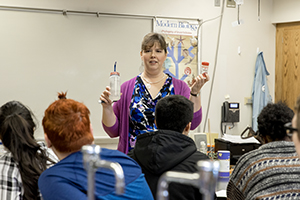Diane Kallmeyer

Job Title: Instructor of Biology and Chemistry, Indiana Academy for Science, Mathematics, and Humanities
Dr. Diane Kallmeyer teaches dual credit biology courses at the Indiana Academy for Science, Mathematics, and Humanities, a residential high school for the gifted and talented, located on the Ball State University campus.
The Academy is ranked as the #1 Best Public High School in Indiana, and its teachers are ranked #1 Best Public High School Teachers in Indiana. Academy teachers are also ranked #4 Best Public High School Teachers in America. Kallmeyer previously taught biology at Ball State.
Kallmeyer received her master’s in aquatic biology and fisheries from Ball State and her PhD in biology from the University of Cincinnati.
Q: Why do you think the dual credit program is important?
A: It benefits both students and the university. Adjusting to college-level expectations at a high school allows students to have small class sizes and interpersonal attention that they may not receive at a large university. High school students get a taste of college-level courses and expectations while still in a controlled environment. Dual credit students should be better prepared for college academics and more likely to complete their college degrees.
Q: How do you articulate dual credit benefits to students and parents?
A: For students, I mention they can take classes now that they will get college credit for, so they don’t have to take the equivalent course in college. Students like the idea of getting college credit as a high school student, and they always seem to like not having to take a class in college. For the parents, I discuss the benefits of their child gaining college credit now, which can save them on tuition later.
Q: How would you describe the progression you see in students pursuing dual credit courses?
A: Students gain the same content as a typical college student, but with the smaller class size, I can focus on critical thinking, communication, and problem solving skills. In larger lecture halls, content can be assessed, but critical thinking is more difficult to foster and evaluate. If students are struggling in the dual credit courses, we have resources available to help them not only with their study skills but also time management and organization. These skills help them be successful now, in college, and in their careers.
Q: How do you “intensify” dual credit courses so that they also meet collegiate standards?
A: I have had a lot of experience as a college faculty member teaching a variety of courses from introductory biology to upper division courses. Now, I work at a high school for gifted and talented students, and I have not changed the level at which I teach. In some ways, I have enhanced my teaching for the gifted students. Instead of memorizing important concepts and regurgitating content, students are expected to apply them in appropriate hypothetical situations.
Q: What has been the highlight of your teaching career?
A: The best part is when a student claims they are “not good in science,” but I can connect them to something that interests them. A few even decide to go into science after they see what they can do. I like to share my enthusiasm for the natural world because excitement is contagious. At the Academy, I mentored a student who created, designed, and performed her own research project, which she later presented at the Indiana Branch of the American Society of Microbiology - as a high school student. She was presenting alongside undergraduate and graduate students. When I can help others break down their own walls to help them discover their potential, it is extremely rewarding.